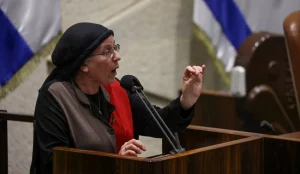The Difference a Few Words Make on How Israelis View the Settlements
MK Orit Strock did not miss a beat. She approached Naftali Bennett, waved her arms and screamed at him: “You’re sitting on the prime minister’s chair thanks to the votes of the young settlement movement.” This happened two weeks ago, during the nervous debate on the “electricity bill,” a bill meant to regulate the hookup of Arab communities not yet connected to the national grid.
Strock’s choice of the term “young settlement movement” was no coincidence. This is a specialty of the settlers, who manage to attach new labels to old definitions in an attempt to alter people’s perceptions. The “young settlement movement’ used to be the “illegal settlements.” These are, after all, 70 outposts that were set up illegally over the years, in contravention of government decisions, some of them on private Palestinian land (such as Homesh), some on so-called “state-owned” land (not ours), and some on military land.
These outposts were built outside the larger settlement blocs in an effort to make any attempt at a territorial compromise impossible. They managed to evade numerous cabinet rulings which determined that these outposts must be evacuated. Strock wishes to deliver regulated electricity to these outposts to make them more permanently entrenched.
The problem is that the media (not all of it) happily embraces the new terminology. This is, after all, a successful moniker, pleasant and attractive; who doesn’t want to be young? The world belongs to the young, after all. Could it be that these young people are land robbers perpetrating pogroms against their Palestinian neighbors, establishing a terrorizing and intimidating presence in their surroundings, uprooting olive trees, stoning Palestinian cars (this is what killed Aisha al-Rabi), entering villages to torch cars, break street lights and windows, even burning houses with their occupants still inside, as happened in Duma? It couldn’t be. After all, these are the beautiful, innocent “young settlers.”
The changing of perceptions through words did not begin now. In 1980, the settlers established an organization that would work for the expansion of settlements and a deepening of the occupation. They looked for a name that would depict them as a government-associated agency, which would afford them wide public legitimacy. Thus, they chose the name Yesha (Hebrew acronym for Judea and Samaria) Council. The name is reminiscent of a city or regional council, namely, a part of the establishment. And indeed, when the council’s head is invited to speak to the media, everyone is sure that he is part of the government, something which adds to his power, the respect he gets and the influence he has on public opinion. The politics of words.
Around the same time, in 1978, a group of leftists decided to establish an organization that would work toward solving the conflict and establishing two states for two peoples. The opposite of the Yesha Council. They decided to call it Peace Now, clearly the name of a private organization with interests of its own, not part of the establishment, which weakens it in public opinion.
So, do we have a public organization vs. a private one? Not at all. The Yesha Council is a totally private organization. It’s not part of any establishment. Its misleading name was given deliberately.
A third example: Right after the Six-Day War we called it the West Bank, sometimes the “occupied territories.” Then the word occupied was dropped, leaving the “territories.” But right-wing propagandists worked hard and managed to change this to “Judea and Samaria.” This makes all the difference in the world.
When one says West Bank, it’s clearly Jordan’s, not ours. When one says “occupied territories,” one means territory that needs to be returned. The word “territories” also implies that it’s not ours. In contrast, “Judea and Samaria” are ours since it’s from the Bible, it’s part of our forefathers’ land, where Saul, David and Solomon reigned. It’s holy land where our patriarchs and matriarchs were buried. Perhaps Jacob’s ladder is somewhere close by as well. So how could anyone even conceive of returning sacred land, appearing in the land registry called the Bible?
This article is reproduced in its entirety

